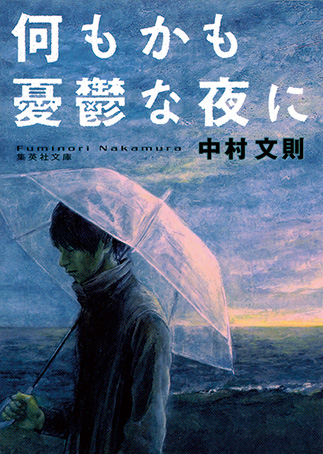
FICTION
Nani mo ka mo yūutsu na yoru ni
[On a Night When All Is Misery]
Shūeisha (Shūeisha Bunko), 2012. 200 pp. ¥400. ISBN 978-4-08- 746798-7. (Originally published in Subaru, Nov. 2008.)
Also published in: Chinese, Korean, and Spanish
Since his debut, Nakamura Fuminori has staked out unusual ground for a young writer by exploring crime, murder, suicide, child abuse and neglect, and other problems plaguing modern Japanese society. His latest work is no exception. The main character, a young man working as a guard in a rural prison, spends his days dealing with the convicts there.
The protagonist was raised in an orphanage and has his own dark past, including an attempt on his own life. Thanks to the influence of the good-hearted orphanage director, he found the will to live and was able to reach adulthood, but a friend was not so fortunate: written on his suicide note were the words “On a night when all is misery.”
The protagonist finds himself troubled by the case of a convicted murderer incarcerated at the prison. Still a minor, the convict merely waits resignedly for his death sentence to be carried out. Why does he not fight his conviction? Does he deserve to die? Is the death penalty justifiable in the first place? The main character confronts such questions, to which there are no easy answers.
The publication of this work was timely: Japan had just announced a lay judge system (to be launched in 2009) in which citizens serve as de facto jurors, leading to heightened consciousness of how trials are conducted and culpability assessed. Debate about capital punishment has also grown heated in recent years. In the context of these social developments, this novel takes on a significance reaching beyond that of a mere work of fiction. (NM)
The protagonist was raised in an orphanage and has his own dark past, including an attempt on his own life. Thanks to the influence of the good-hearted orphanage director, he found the will to live and was able to reach adulthood, but a friend was not so fortunate: written on his suicide note were the words “On a night when all is misery.”
The protagonist finds himself troubled by the case of a convicted murderer incarcerated at the prison. Still a minor, the convict merely waits resignedly for his death sentence to be carried out. Why does he not fight his conviction? Does he deserve to die? Is the death penalty justifiable in the first place? The main character confronts such questions, to which there are no easy answers.
The publication of this work was timely: Japan had just announced a lay judge system (to be launched in 2009) in which citizens serve as de facto jurors, leading to heightened consciousness of how trials are conducted and culpability assessed. Debate about capital punishment has also grown heated in recent years. In the context of these social developments, this novel takes on a significance reaching beyond that of a mere work of fiction. (NM)

Translation rights inquiries
Shūeisha Inc.
3-13-1 Kanda Jimbō-chō, Chiyoda-ku,
Tokyo 101-0051

